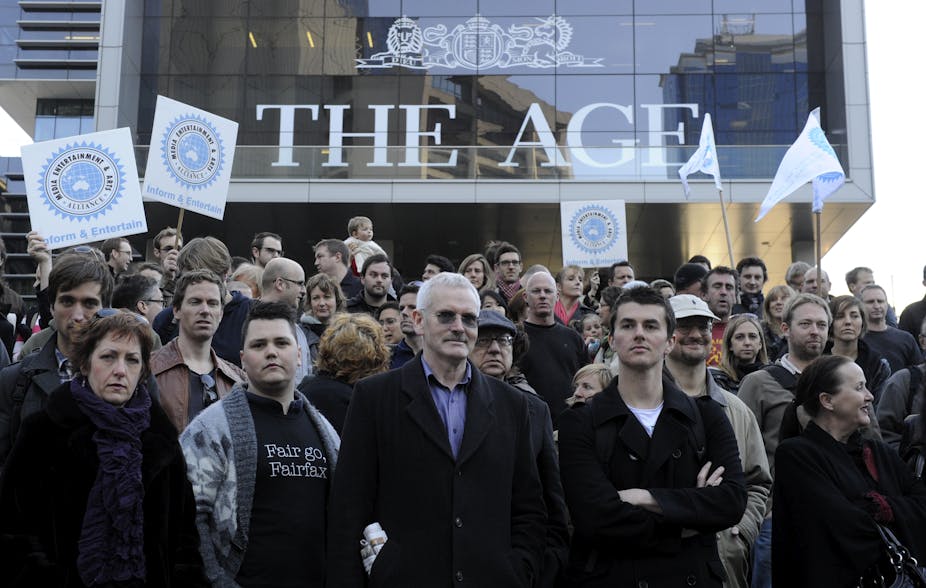It is elementary that most business investors seek to make money. But Gina Rinehart’s investment in Fairfax is not aimed at a financial return. There are a hundred other, healthier companies where this is possible, if that was genuinely her aim. Though she is tight-lipped about her own editorial priorities, there have been enough hints from those close to her to establish the real agenda.
In late 2010 when Rinehart made her first media investment in the Ten Network, her friend, columnist Andrew Bolt, wrote about her motives. He dismissed the idea that she sought to make money. “My strong and not entirely uninformed hunch,” he said, “is that much bigger issues are at play involving our country’s future and threats to wealth we’ve taken for granted”.
The clue, Bolt said, was a statement by Hancock Prospecting that it was interested in the news media “given its importance to the nation’s future”.
Bolt’s column went on. “Rinehart is on a mission. Channel 10 is just the vehicle”. He then pondered her chances of turning Ten into “an Australian Fox News”. Significantly, Bolt’s column is still on the website of Rinehart’s lobby group, Australians for Northern Development and Vision.
The reference to Rupert Murdoch’s right wing Fox News Channel is eerily reminiscent of a statement from British climate “sceptic” Lord Monckton. Monckton toured Australia promoting climate scepticism in 2010 and 2011. Rinehart made a donation to cover part of the 2010 tour and in 2011, Monckton delivered the Lang Hancock Lecture at Notre Dame University, sponsored by Rinehart’s company. Monckton also made a less publicised speech at a seminar sponsored by the Mannkall Economic Education Foundation.
In this speech Monckton discussed strategy for the free market, climate sceptic Right in Australia. He urged those he called “the super rich” to invest in or establish a satellite TV channel, so that people like Andrew Bolt could get more airplay. He lamented that there was no “Australian version of Fox News”. He added: “Frankly whatever you do at a street level - which is what you are talking about here - is not going to have much of an impact compared with capturing an entire news media.”
Capturing an entire news media is what is now happening at Fairfax.
Rinehart’s “mission” can also be deduced from ANDEV, the position papers of which are on her website. ANDEV is a largely a front for the mining industry. Its main policy favours the creation of “Special Economic Zones” which would “secure the lowest possible tax rates for the remote north of Australia”, especially the elimination of any resource tax.
A founding member of ANDEV is John McRobert, a key figure behind Pauline Hanson’s tax policies at the 1998 election. In 2010, Brisbane-based McRobert, who has known Rinehart for 30 years, said that “Gina is deeply concerned about this country and the way it’s going and she wants to have a voice, somehow”. Other supporters of ANDEV include miner Hugh Morgan, a godfather of the New Right in Australia and Professor Ian Plimer, a notable sceptic whom Rinehart has appointed to boards of her companies.
Rinehart’s call for “Special Economic Zones” has also been championed by right wing think tank the Institute of Public Affairs (IPA). The IPA now has a “North Australia Project” which it describes as a “joint project” of ANDEV and the IPA. Its director, John Shipp, echoed Rinehart’s call for the abolition of the mining tax and the carbon tax as well as industrial relations “reform”.
All of this is recognisable as representing the agenda of one side of politics.
The traditional justification for journalism has been that it can act as a watchdog on powerful government and corporations. What is now occurring is that representatives of one of the most powerful sectors in Australian society, the mining industry, are seeking to dominate one of the important accountability mechanisms in a democracy.
None of this means Rinehart will succeed easily. As well as having no background in news media, she will face a journalistic workforce which has a history of pushing back against attempts to interfere with journalism. This is something which the now disgraced Canadian press baron Conrad Black discovered and which young Warwick Fairfax also experienced in his disastrous 1987 privatisation attempt.
Moreover, Fairfax readers have come to expect an intelligent and independent approach to journalism. The imposition of Rinehart’s political priorities will deepen the financial crisis at Fairfax because many readers will simply abandon it. That is why this week Communications Minister, Stephen Conroy, warned her not to “trash” the brand of Fairfax, while Malcolm Turnbull has advised her that Fairfax’s business model would be undermined “if Fairfax was seen to be a mouthpiece of Gina Rinehart and a spokesvehicle for the mining industry”.
While many are appalled at Rinehart’s bid for control of Fairfax, some are portraying it as salvation for quality journalism. Tony Abbott’s reaction was: “Good on Gina for being prepared to invest in journalism at a difficult time,”.
It may be good for Tony Abbott, but the Rinehart cure for Fairfax may be worse than the disease.

